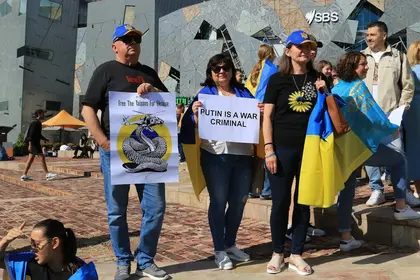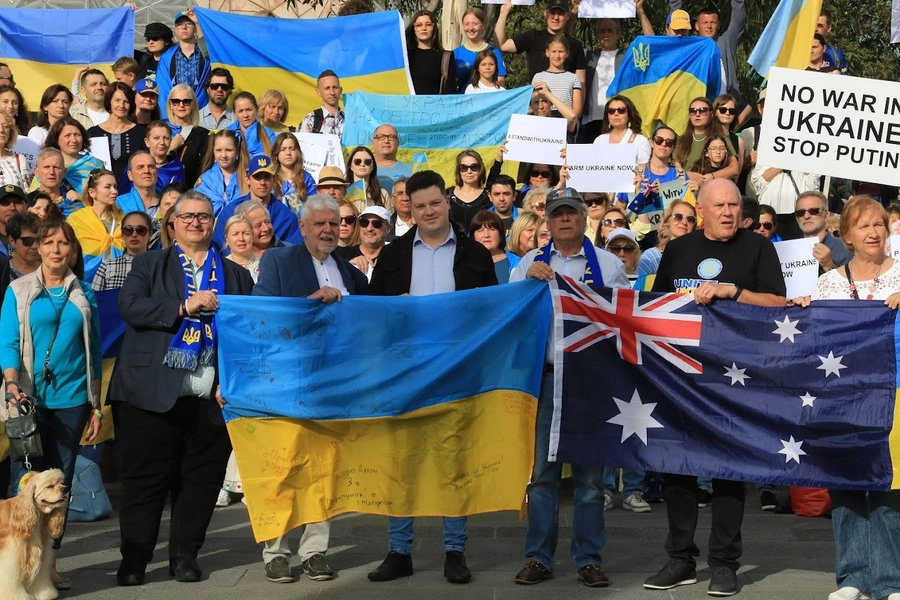The public release of Lieutenant General Kyrylo Budanov's December letter to Australian Defence Minister Richard Marles has shed light on why Ukraine needs Taipan helicopters. It also casts as irrelevant certain problems the Department of Defence had complained about regarding the operation of the fleet.
Australia’s government, whilst providing aid to Ukraine, needs to increase this level of aid and explain to the public why providing it is in the interests of every Australian.
JOIN US ON TELEGRAM
Follow our coverage of the war on the @Kyivpost_official.
Australian Ukrainians demonstrating in Melbourne on Jan. 19,2024 against Russia's war on Ukraine and calling on the Australian government to support Kyiv with arms. Photo: Oleksandr Evglievski.
Vladimir Putin’s Russia has publicly made clear its goal of restoring the Tsarist Empire – an empire that was larger than the Soviet Union – by conquest if neighboring nations object to being re-colonized.
Ukraine, the largest of Russia's former colonies, is merely the first victim of this campaign of conquest. Russia's methods in occupied Ukraine differ little from those of Nazi Germany, with concentration camps being renamed as “filtration camps”. There are daily drone and missile attacks on civilian targets, just like the Nazi Blitz against the UK.
British Prime Minister Rishi Sunak put it very bluntly in his address to the Commons on Jan. 15: “If Putin wins in Ukraine, he will not stop there, and other malign actors will be emboldened. That is why Ukraine’s security is our security.”

Zelensky: Trump’s ‘Just and Fair’ Rhetoric on Russia ‘Exactly What Putin Is Afraid Of’
The same applies to Australia. As an ally of the US and the UK, it is almost certain that Australia would be pulled into a major war in Europe, just as we were drawn into World Wars I and II.
So, providing military aid to Ukraine is cheap insurance against the costs Australia would incur should Russia be allowed to continue its attempted conquest of Eastern Europe.
Why the helicopters matter
The early retirement of Australia's fleet of 45 MRH-90 helicopters presented the government with a wonderful opportunity to contribute this surplus to Ukraine's war effort at little cost to the taxpayer.
For reasons not explained, along with scripted commentaries that do not fit observed and known facts, Defence decided to strip the helicopters and sell off their components as used spare parts. This was likely at a small fraction of the new buy price and at considerable cost in terms of disassembling the aircraft. The remaining fuselages are to be buried.
Ostensibly, this is because no buyer could be found for the retired fleet. Evidently, Ukraine was not approached as a buyer.
In the past, Defence has claimed that obligations to support military equipment sent to Ukraine presented challenges that Australia could not afford, or that technical problems with equipment would make it unsuitable or unsafe for use in Ukraine.
Yet Ukraine's military has accrued more combat experience and technical support experience in two years of fighting Russia than the Australian Defence Force (ADF) has accrued since the Korean War 70 years ago. Ukraine has fought and won the kind of battles Australian troops have not fought since WWII 80 years ago.
Ukraine's industry and military engineers have successfully operated a remarkably diverse mix of Soviet and Western weapons, from low-tech WWII equipment to state-of-the-art missile and radar systems. And they have innovated in tactics and technology in a way not seen in Australia since the 1940s.
The notion that, somehow, Defence knows what is best for Ukraine shows some possible lack of understanding of the biggest nation-state war seen in Europe since WWII, in which both sides employ state-of-the-art weapons, technology, and tactics.
The letter addressed the risks
Budanov's letter shows that the Ukrainian military had already considered and assessed all of the risks that Defence now claims precluded the supply of the Taipans to Ukraine and had already planned appropriate and professionally sound measures to deal with them.
Budanov spelled these measures out in very clear English language text last December.
Rather than taking the opportunity to further the national interest, impress our overseas allies, and ask the government to donate the Taipans to Ukraine, Defence evidently provided some dubious excuses in the hope that the government could fob off these pesky Ukrainians, while continuing to trash the Taipan fleet.
Yesterday, I counted half a dozen overseas media reports discussing how Defence decided it was better to bury over 40 modern helicopters than donate them to Ukraine. Not a good image.
Ukraine offered to absolve Defence of all the responsibilities of a seller that Defence apparently immensely fears, and take on these risks in accepting the helicopters as is. Yet this was evidently not enough for Defence, which begs some serious questions that require immediate answers.
Having visited Ukraine four times in 2023 and met with Budanov, Valery Zaluzhny, and government officials, the takeaway message was clear: Call on Australia to continue to be our strong partner and friend. We appreciate their support.
The government has one good option for salvaging this mess: a prompt decision to reassemble and donate the helicopters to Ukraine. If the government continues to follow the department's dubious advice, it may have to deal with the international embarrassment that no scripted media soundbites can fix.
The Australian government and the Australian people are too strong a partner and respected friends of Ukraine to allow this to happen.
The views expressed are the author’s and not necessarily of Kyiv Post.
You can also highlight the text and press Ctrl + Enter











